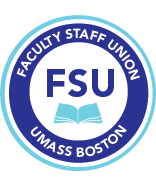The Point: Reasons to Be Cheerful
5/14/2025
This week’s Point was written by Jeff Melnick, former VP and Communications Director of the FSU.
So for you close readers out there, yes our title this final week of the semester is borrowed from British rocker Ian Dury’s 1979 song which uses this title to celebrate all manner of cultural bounty—from cheddar cheese to Buddy Holly to Marxism (well, of the Groucho, Harpo, and Chico variety anyway). But it’s also our little nod to Italian theorist Antonio Gramsci’s influential maxim about maintaining “optimism of the will” (in tandem with “pessimism of the intellect,” of course).
We are not trying to pull the wool over your eyes, honestly. According to just about every meaningful metric this has been a heartbreakingly terrible year—inside higher education and beyond. But The Point crew also agreed that it is important to accentuate the positive as the school year ends--if only as a reminder of all the power we can summon as a collective. With that in mind, we share with you a few glimmers of hope in these dark days.
Mutuality:
Across the United States faculty and staff at institutions are remembering that collectivity is the key to our power. We want to highlight for you, especially, the work of some colleagues at Rutgers, who have devised and adopted what they call a “Mutual Academic Defense Contract” (MADC). Without getting lost in the weeds of all their “Whereas” paragraphs let us just quote the heart of the matter—a response to the Trump administration’s attack on individual institutions:
Be it further resolved that, participating institutions shall make available, at the request of the institution under direct political infringement, the services of their legal counsel, governance experts, and public affairs offices to coordinate a unified and vigorous response, including but not limited to: Legal representation and countersuit actions; strategic public communication; amicus briefs and expert testimony; legislative advocacy and coalition-building; related topical research as needed.
Our colleagues at UMass Amherst have also been very active on this front and we are pleased that our own Faculty Council has endorsed the MADC resolution generated there. UMA colleagues have also been busy creating a "tracker" for MADC efforts around the nation.
As activists have taught us to chant at rallies: we keep us safe. While there is also hope to be found outside of our numbers—in the courts, in (some) administrative suites, and so on—it remains crucial that we abjure any belief in a mythical calvary that is coming to rescue us. The university is ours—but only if we fight for it.
With that in mind, it is a good time to start taking note of—and perhaps even joining with—the work of Higher Ed Labor United who are at the forefront of many important anti-authoritarian efforts.
Activism:
We are inspired and challenged by the continued bravery of student activists across the country who have simply refused to accept the narratives composed and circulated by the most powerful figures in our culture. What students have been quick to understand is that the brutal attacks on anti-genocide protesters across the country represent an unholy alliance of opportunistic elected officials, university administrators and Boards of Trustees, and militarized police, all of whom are signed on (at least implicitly) to the idea that college campuses should be run in a dystopian hierarchical way—where executive orders issued from the White House, endorsed by college presidents trustees, and provosts, and implemented by modern-day storm troopers replace the shared governance that has been at the heart of our mission for at least half a century. From Columbia to UCLA to our own backyard at Tufts, we have seen student activists beaten, bloodied, abducted and deported. The hysteria has caught some of our students in its web: while these cases seem to have resolved with relatively little harm, we need to remain vigilant and stalwart about our students’ basic security and their rights to free expression and assembly.
Leadership:
Regular readers of The Point will not be surprised to hear that we do not expect top university administrators to lead the charge (or even really be loyal foot soldiers) in the ongoing fight against the authoritarian attacks the Trump administration has brought to our campuses. But credit where credit is due: it is not nothing that hundreds of college and university leaders have signed on to a letter opposing “undue government intrusion in the lives of those who learn, live, and work on our campuses. With truly tin-eared ahistoricism these leaders have titled their pledge “A Call for Constructive Engagement”—“constructive engagement” is what Ronald Reagan called his strategy of appeasement to South Africa’s apartheid government in the 1980s—but the content of it is impressive as far as it goes. Now it is on the rest of us to keep putting pressure on our deans and provosts and chancellors to step up their game and defend the basic mission of higher education.
As always, please write us at fsu@umb.edu with your thoughts on any of this. And accept our wishes for a peaceful end of semester and rejuvenating summer.
